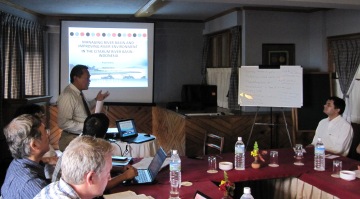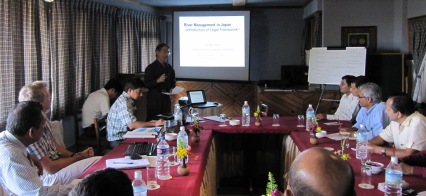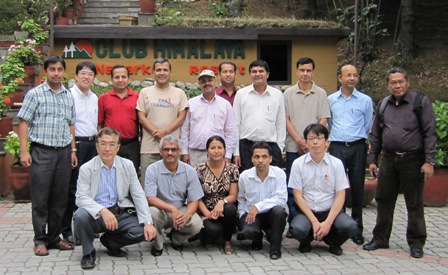NARBO
Report of Training at Nagarkot organized by JWA
NARBO Secretariat
![]()
Background and Target of the Training
CDTA7547 “Supporting Investment on Water Security in River Basins” primarily aims at supporting River Basin Organizations (RBOs) in the Asian river basins which are implementing Integrated Water Resources Management (IWRM). The TA is conducted by Japan Water Agency (JWA) and Asian Development Bank (ADB) targeting three river basins: i) Solo River, Indonesia, ii) Bagmati River, Nepal and iii) Syrdarya River, Uzbekistan. Network of Asian River Basin Organizations (NARBO) is partially collaborating with this TA in the capacity development portion.
As a part of many activities of TA, one training course for concerned staff of Nepal was organized to promote IWRM in the Bagmati River basin and to share the experiences with NARBO members, using the “IWRM Guidelines at River Basin Level” published by UNESCO in 2009.
There are too many issues in the Bagmati River basin such as lack of domestic water, deteriorated water quality, uncontrolled land use, haphazard and rapid urbanization, overextraction of groundwater causing land subsidence, lack of electricity, fragmented responsibilities regarding water management, and so on.
Participants of the training were expected to consider sustainable Bagmati river environment as well as water resources development focusing on effective participatory approach and good water governance. Developing ‘IWRM Spiral’ in Bagmati River basin and finding out ‘Keys to Success’ to solve the above mentioned issues were programmed.
What happened at Nagarkot?
The training was held at the Club Himalaya Resort in Nagarkot, which is located around 20km from Kathmandu, on May 31st and June 1st, 2012.
Experts from Japan Water Agency and Perum Jasa Tirta II (PJT II) , Indonesia and participants from Nepal exchanged each other’s experiences on IWRM. Intensive discussions on how to improve current situation of the Bagmati River were made among experts and participants.
On the 1st day of the training, Mr. Herman Idrus, Director, JPT II shared his experiences on IWRM in the Citarum River by focusing on the improvement of river basin environment. He explained water quality management in the Citarum River and introduced the following ‘Keys to Success:
- Appropriate human resources are important to carry out proper operational works and also to have a vision on managing water quality management system as a whole.
- Comprehensive and customized database and information system are supporting tools for good decision making.
- Collaboration and mutual coordination with other agencies are a must to make an integrated plan, to put the plan into action, and to utilize monitoring result for law enforcement.
At the end of his presentation, he stressed that rivers with complex problems should be managed by multi-sectoral approach.
 |
 |
Intensive group discussions on 2 June, 2012 |
|
Mr. Kawasaki also explained concept of ‘IWRM Spiral’ and ‘Keys to Success’ in implementation of IWRM by introducing some case studies.
At the end of his presentation, he stated that the importance of i) thinking about the differences of characteristic of basins, ii) perspective of IWRM, iii) each sector’s perspective, and iv) added value. After his presentation, ‘Keys to Success’ in the Bagmati River was explored and discussed among all participants and experts. We identified potential ‘Key for Successes’ on each phase of ‘IWRM Spiral’ on the Bagmati River.
At the end of the training, Mr. Shishir Koirala, Water and Energy Commission Secretariat (WECS), Nepal summarized the training as follows, and concluded his remarks by praising successful conclusion of the training.
i) We learnt new insights on IWRM through the training, and concept of IWRM is new to Nepal.
ii) However, how to apply IWRM process into the Bagmati River in the future is the issue.
iii) By using the knowledge, better and happy river for the people will be realized in the future.
Outcome of Training
Participants of the training had already recognized the existence of many stakeholders in the basin and necessity of functioning institutional framework. After the conclusion of the training, importance of each sector’s perspective was well understood. ‘IWRM Spiral’ and ‘Keys to Success’ of the Bagmati River contributed to the preparation of roadmap of investment plan for the Bagmati River. Recommendations for going up ‘IWRM Spiral’ and discussed ‘Keys to Success’ of the Bagmati River will contribute to the improvement of IWRM in their river basin. Result of the training is expected to contribute to the management of the future IWRM related projects.
Way Forward
The training provided by experts from JWA and PJTII for participants from Nepal and had great success with capacity building. Experiences of the Bagmati River will be shared among NARBO for improving IWRM. In addition, NARBO has many good case studies of IWRM and various types of RBOs. More case studies should be shared with colleagues in Nepal for assisting them to establish appropriate types of RBOs.
 |
Group Photo |
Program of the Training
1st day (31 May 2012)
9:00 - 10:30 |
Move to Nagarkot |
|
11:30 - 11:40 |
Training orientation |
RETA Team: |
11:40 - 12:10 |
Introduction |
RETA Team: |
12:10 - 12:40 |
Outline of UNESCO IWRM Guidelines |
NARBO: |
12:40 - 13:30 |
Lunch |
|
13:30 - 14:10 |
Case study 1 (Citarum River – Participatory approach and government role) |
PJT2: Herman Idrus |
14:10 - 14:40 |
Q&A |
|
14:40 - 15:00 |
Break |
|
15:00 - 15:40 |
Case study 2 (River Law in Japan – history and practice) |
RETA Team |
15:40 - 16:00 |
Q&A |
|
16:00 - 16:10 |
Wrap up and schedule of next day |
RETA Team: Kunieda |
18:30 - |
Dinner |
2nd day IWRM Training (1 June 2012)
9:00 - 9:30 |
From IWRM Guidelines |
NARBO |
9:30 - 11:00 |
From IWRM Guidelines |
NARBO |
11:00 -11:20 |
Break |
|
11:20 - 12:00 |
Introduction of Keys for Success |
NARBO |
12:00 - 13:00 |
Discussion on KfS for Bagmati River |
NARBO |
13:00 - 14:00 |
Lunch |
|
14:00 - 14:30 |
Closing, certificate |
|
14:30 - 16:00 |
Move to KTM |
|